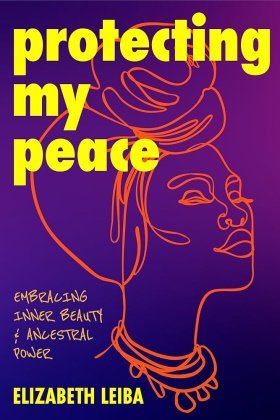6.How do you think these societal perceptions and stereotypes manifest in tangible consequences for Black women in various spheres like the workplace, relationships, and personal well-being?
7.What does the concept of “decolonizing the mind” mean to you, especially as a Black woman navigating a world filled with colonized narratives?
8.Can you identify moments or experiences in your life that have contributed to your journey of decolonizing your mind and reclaiming your authentic self?
9.How can you actively engage in deconstructing stereotypes, not just for yourself, but to help shift societal narratives about Black women at large?
10.How does being part of a supportive community of Black women facilitate the process of decolonizing the mind and challenging stereotypes?
affirmations 
1.I am deeply rooted in the African Sacred Feminine, channeling its power, wisdom, and nurturing spirit.
2.The strength of countless generations of powerful Black women flows within me, guiding and sustaining me.
3.I rise above stereotypes, knowing that my worth and identity are not defined by society’s narrow perceptions.
4.I am authentically me, embracing my unique journey and experiences, undeterred by external judgments.
5.Every day, I reclaim my narrative, actively decolonizing my mind and breaking free from limiting beliefs.
6.I challenge and change societal perceptions, recognizing that my voice and presence matter.
7.I am on a continuous path of healing and growth, shedding the weight of imposed stereotypes and embracing my true self.
8.I draw strength from my ancestors, standing tall on their shoulders, and honoring their legacy through my actions.
9.I am part of a vibrant community of Black women, and together we uplift, support, and empower one another.
10.I am a beautiful blend of history, culture, resilience, and wisdom, and I wear each facet with pride.

140.Hill Collins, Patricia. 2009. Black Feminist Thought: Knowledge, Consciousness, and the Politics of Empowerment. New York: Routledge.
141.Badejo, Diedre. 1996. Osun Seegesi: The Elegant Deity of Wealth, Power, and Femininity. Trenton: Africa World Press.
142.Hill Collins, Patricia. 2013. On Intellectual Activism. Philadelphia: Temple University Press.
143.Drake, St. Clair. Black Folk Here and There: An Essay in History and Anthropology. United States: Center for Afro-American Studies, University of California, 1987.
144.Razak, Ariska. 2016. “Sacred Women of Africa and the African Diaspora: A Womanist Vision of Black W Vision of Black Women’s Bodies and the African Sacr s Bodies and the African Sacred Feminine.” International Journal of Transpersonal Studies 35 (1): 129–147.
145.Salami, 2015.
146.Meisenhelder, 2003.
147.Parkinson, Justin. 2016. “The significance of Sarah Baartman.” BBC. www.bbc.com/news/magazine-35240987.
148.“Stereotype.” n.d. Oxford Reference. Accessed July 5, 2023. www.oxfordreference.com/display/10.1093/oi/authority.20110803100530532;jsessionid=022F8C533615C62CE4CE90B41DF2AA17.
149.White, Deborah G. 1999. Ar’n’t I a woman?: female slaves in the plantation South. New York: WW Norton.
150.Jerald, Morgan C., L. M. Ward, Kyla D. Fletcher, Lolita Moss, Khia Thomas, and Kyla D. Fletcher. 2017. “Subordinates, Sex Objects, or Sapphires? Investigating Contributions of Media Use to Black Students’ Femininity Ideologies and Stereotypes About Black Women.” Journal of Black Psychology 43, no. 6 (September): 608–635.
151.Anderson, Joel R., Elise Holland, Courtney Heldreth, and Scott P. Johnson. 2018. “Revisiting the Jezebel Stereotype: The Impact of Target Race on Sexual Objectification.” Psychology of Women Quarterly 42, no. 4 (December): 461–476.
152.Leath, Seanna, Martinque Jones, Morgan C. Jerald, and Tiani R. Perkins. 2022. “An investigation of Jezebel stereotype awareness, gendered racial identity and sexual beliefs and behaviors among Black adult women.” Culture, Health & Sexuality 24, no. 4 (April): 517–532.
153.Washington, Patricia A. 2001. “Disclosure Patterns of Black Female Sexual Assault Survivors.” Violence Against Women 7, no. 11 (November): 1254–1283.
154.Donovan, Roxanne A. 2011. “Tough or Tender: (Dis)Similarities in White College Students’ Perceptions of Black and White Women.” Psychology of Women Quarterly 35, no. 3 (September): 458–468.
155.Bost, Suzanne. 1998. “Fluidity without Postmodernism: Michelle Cliff and the “Tragic Mulatta” Tradition.” African American Review 32 (4): 673–689.
156.Higginbotham, Evelyn B. 1993. Righteous Discontent: The Women’s Movement in the Black Baptist Church, 1880–1920. Edited by Evelyn B. Higginbotham. Cambridge: Harvard University Press.
157.Corbin, Nichola, William Smith, and Roberto J. Garcia. 2018. “Trapped between justified anger and being the strong Black woman: Black college women coping with racial battle fatigue at historically and predominantly White institutions.” International Journal of Qualitative Studies in Education 31, no. 7 (May): 626.
158.Corbin, et al., 2018.
159.Woodard, Jennifer B., and Teresa Mastin. 2005. “Black Womanhood: Essence and its Treatment of Stereotypical Images of Black Women.” Journal of Black Studies 36, no. 2 (November): 264–281.
160.Harris-Perry, Melissa V. 2011. Sister Citizen: Shame, Stereotypes, and Black Women in America. London: Yale University Press.
161.Jones, Trina, and Kimberly Norwood. 2017. “Aggressive Encounters & White Fragility: Deconstructing the Trope of the Angry Black Woman.” Iowa Law Review 102 (5).
162.Collins, 2009.

























